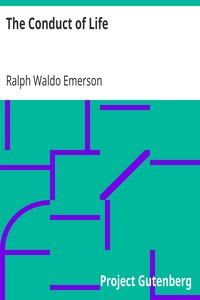| Creator |
Emerson, Ralph Waldo, 1803-1882 |
| Title |
The Conduct of Life
|
| Note |
Wikipedia page about this book: https://en.wikipedia.org/wiki/The_Conduct_of_Life
|
| Note |
Reading ease score: 66.6 (8th & 9th grade). Neither easy nor difficult to read.
|
| Contents |
Fate -- Power -- Wealth -- Culture -- Behavior -- Worship -- Considerations by the way -- Beauty -- Illusions.
|
| Credits |
Produced by Al Haines
|
| Summary |
"The Conduct of Life" by Ralph Waldo Emerson is a philosophical essay written in the mid-19th century. The work explores fundamental questions about human existence and the principles guiding one's life, particularly emphasizing the relationship between fate, power, and individual agency. Emerson seeks to harmonize the duality between fate and freedom, positing that while individual circumstances may constrain one's life, there is also a profound capacity for self-determination and personal growth. At the start of the essay, Emerson introduces "Fate" as a theme, discussing the limitations and challenges that individuals face in life, such as personal and societal pressures. He reflects on the existing conditions of human morality, individual will, and the influence of nature, advocating that true conduct in life necessitates a deep understanding of one's limitations while harnessing the individual's inner strength. The opening suggests that understanding one's existence and navigating life's complexities is not merely a philosophical exercise but a vital necessity for personal transformation and societal progress. (This is an automatically generated summary.)
|
| Language |
English |
| LoC Class |
PS: Language and Literatures: American and Canadian literature
|
| Subject |
Conduct of life
|
| Category |
Text |
| EBook-No. |
39827 |
| Release Date |
May 27, 2012 |
| Copyright Status |
Public domain in the USA. |
| Downloads |
305 downloads in the last 30 days. |
|
Project Gutenberg eBooks are always free!
|

